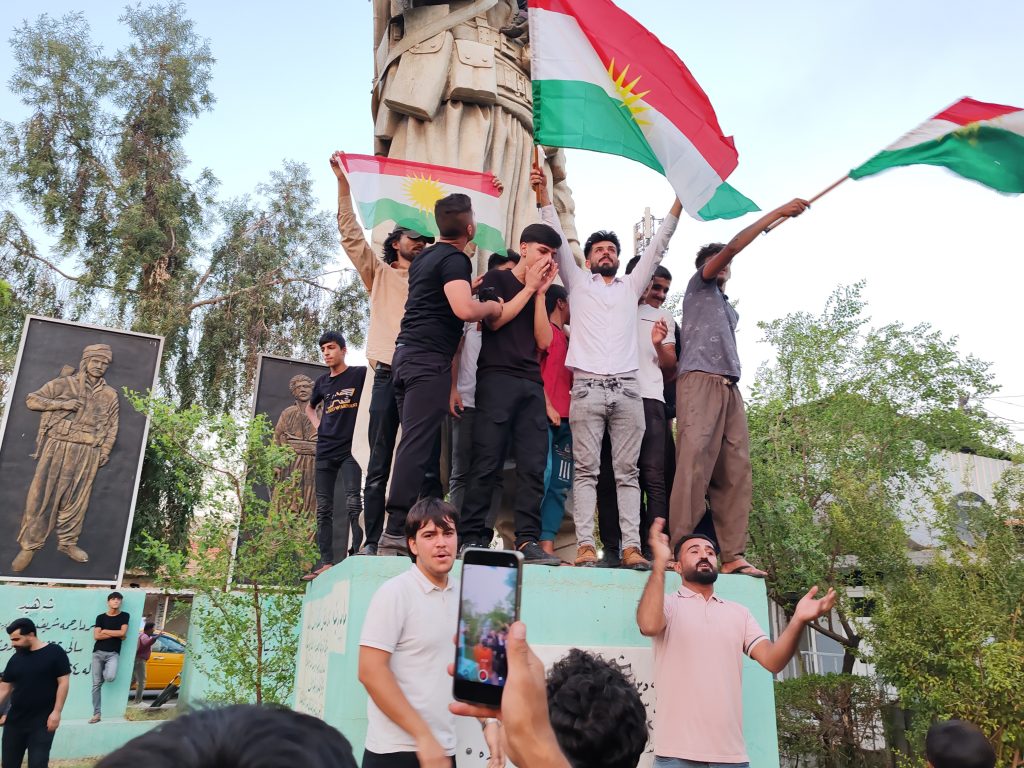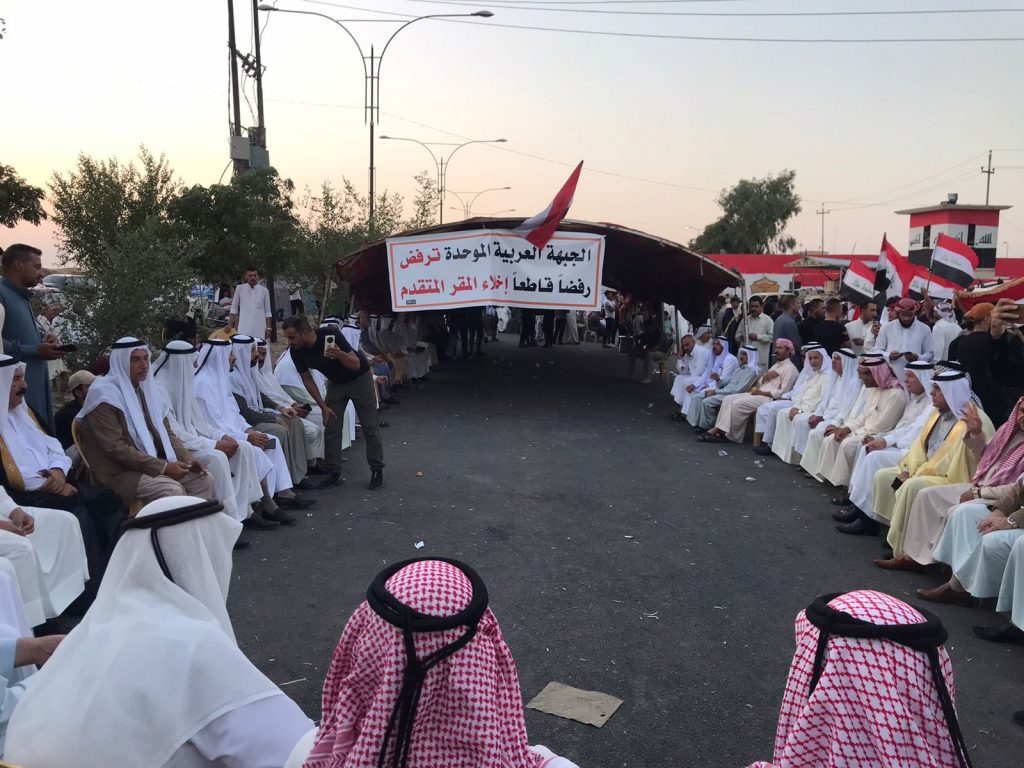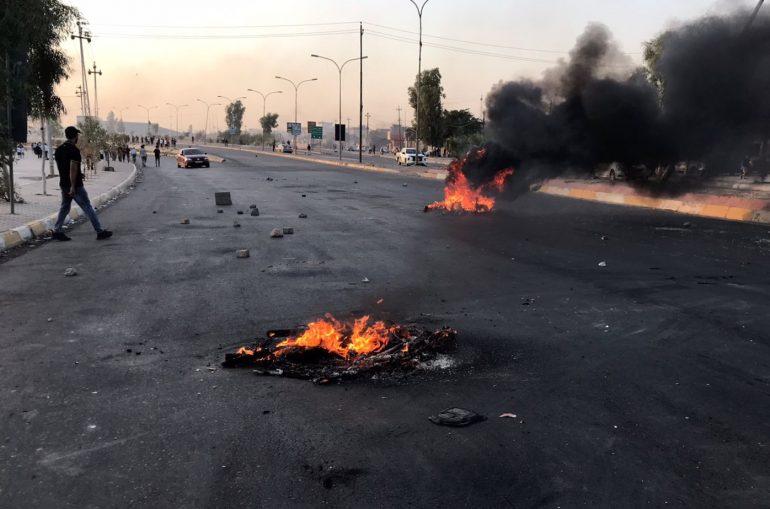Three days after security forces left four Kurdish protesters dead in Kirkuk amid escalating ethnic tensions, the city experienced a fragile calm, as political factions traded blame for the upheaval.
On Saturday, Kurds protested the closure of the Kirkuk-Erbil Road, which was sealed off by Arab and Turkmen groups, including backers of the state-sanctioned Popular Mobilization Forces (PMF). The blockade was designed to thwart an Iraqi government decision to return the Joint Operations Command headquarters—formerly a Kurdistan Democratic Party (KDP) office—to the KDP.
This move sparked a sit-in and blockade by Arab and Turkmen protesters who oppose the KDP’s return to the building. They accuse the KDP of not only perpetrating violence against Kirkuk’s diverse residents during their prior control of the headquarters, but also of fueling the Saturday clashes that led to four deaths and over a dozen injuries.
The KDP rejects these allegations, asserting that the road blockaders are acting on orders from specific Shiite political parties.
Kameran Kirkuki, a KDP member of Kirkuk’s provincial council, points the finger at supporters of Asaib Ahl-Haq (Leagues of the Righteous), led by Qais Al-Khazali. Asaib Ahl-Haq, a pro-Iran militia, ranks among the PMF’s most powerful factions. Kirkuki also singles out Wasfi Al-Assi, emir of the Sunni Arab Al-Obaid tribe.
Kirkuki told The Citadel that for Tehran, Kirkuk is a strategic asset. Iran aims to keep the province under its allies’ control to counterbalance Turkey’s influence. Turkey has several military bases along the Kurdistan Region’s borders and routinely targets the rebel Kurdistan Workers’ Party (PKK), especially in areas northwest of Kirkuk, including Sinjar in Ninewa province.
Since the inauguration of a pro-Iran Iraqi government last year, Tehran has leaned on its Iraqi proxies to maintain its influence over Iraq’s domestic affairs.
“You won’t find any KDP members who are pro-Iran, so Tehran resorts to bombing Erbil and opposing the KDP’s reentry into Kirkuk,” Kirkuki said. Recently, Iran attacked bases of Kurdish rebel groups in the Kurdistan Region, including in Erbil province.

As Iraqi provincial elections near, the KDP aims to make a comeback in Kirkuk after a six-year hiatus. Their absence follows the Iraqi government’s seizure of the city on October 16, 2017, in the wake of a failed Kurdish independence referendum championed by the KDP.
Before 2017, the KDP operated 33 offices in Kirkuk and now seeks to reestablish its presence as campaigning intensifies for the December elections.
Assi, leader of the Arab Front and an Iraqi legislator, has been under the sway of Maliki since 2007. According to Kirkuki, Assi’s organization employs around 2,000 people. Assi was active in the initial sit-in and road blockade staged by Arab and Turkmen protesters, much to the KDP’s displeasure.
Some Sunni Arabs contend that the KDP deliberately escalated Saturday’s protests to fuel tension. Safa Ubeidi, deputy head of the Sunni United Arab Front, told The Citadel that he feels the KDP ‘sparked’ the conflict without gaining any benefits. He stressed that Arab protesters were unarmed and solely objecting to the KDP’s retaking of the headquarters.
Other popular Sunni political forces are more aligned with the KDP. However, even those with good relations to the Barzani-led party are balancing electoral concerns. With provincial elections on the horizon, supporting the handover of the headquarters to the KDP could be politically costly for them. Many Sunni leaders are hesitant to publicly back the move, fearing it could alienate their voter base and negatively impact their electoral performance.
While the KDP asserts it rightfully owns the post-2003 headquarters, Arab and Turkmen protesters contend the land is property of the Iraqi finance ministry. They argue the KDP seeks to re-exert a malign influence by reclaiming a building now utilized by the Joint Operations Command.
Ismail Hadidi, a key Sunni Arab leader in Kirkuk, told The Citadel that local Turkmen and Arabs don’t object to the KDP’s return per se, but rather to the transfer of operational command headquarters back to the party.
In the wake of Saturday’s deadly events, the Iraqi Federal Court halted Premier Mohammed Al-Sudani’s decision to restore the office to the KDP. Masrour Barzani, Prime Minister of the Kurdistan Regional Government (KRG) and KDP deputy leader, denounced the court’s action as a “farce.” The court has often been criticized for an alleged closeness to Tehran.

A local security official told The Citadel under the condition of anonymity that certain Shiite factions have decided the building shouldn’t be returned to the KDP, treating the issue as a “done deal.” These Shiite groups have instructed their supporters to block the KDP’s reoccupation of the office. “The KDP is making a spectacle of its return, and we think that’s unwarranted,” the source said.
The KDP urged its members and supporters to join Saturday’s protests, a decision seen by some as a reaction to the party’s failure to regain control of the office. The security source noted that the KDP felt thwarted by the successful sit-in from Arab and Turkmen protesters and wanted to make a show of strength through public demonstrations.
The protest included more than just KDP members and supporters; it also featured backers of other Kurdish parties and independents. One of the dead had served in the PUK’s Peshmerga forces. Participants saw the road blockade as a punitive measure not only against Kurds but also against anyone relying on the critical Kirkuk-Erbil road.
In response to last week’s deadly incidents, Prime Minister Sudani held a meeting with Kirkuk constituency MPs in the federal parliament to discuss ways to defuse the tensions. An MP at the meeting, Sabah Habib (PUK), told The Citadel that the lawmakers called on the Prime Minister to hold the shooters accountable and to form an investigative committee. Sudani agreed to these demands, according to Habib.
On Monday, another round of protests took place among Kirkuk’s Kurdish community, but this time they ended mostly without incident. Simultaneously, a Kirkuk court issued arrest warrants for those behind the shootings. The State Administration Coalition also announced it would form a committee to examine the broader issue of the KDP reclaiming its office.
As the provincial elections approach, these developments could help the KDP as it contests its first Kirkuk elections since the ill-fated referendum. Many Kurds see both the road blockade and attempts to thwart the KDP’s return as injustices, sentiments that may sway voters in December.


